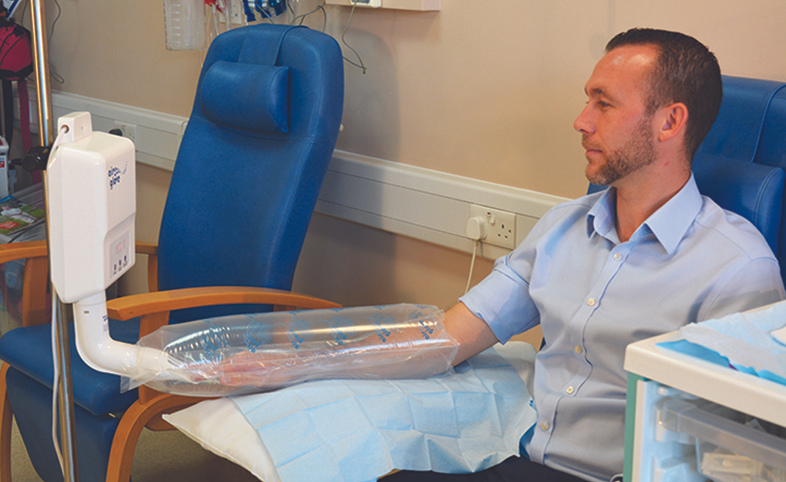Supporting innovators to create a greener future in health and care
Accessing NHS market

Implementing effective carbon reduction strategies

BSI sustainability training courses

Accelerating green innovations



Get in touch
To discuss how we can help your organisation to fulfil its sustainability ambitions, contact innovator.enquiries@healthinnovationeast.co.uk
Our commitment to net zero
Health Innovation East is committed to supporting the response to the health and environment emergency that climate change brings and the drive for a Net Zero NHS as set out in the ‘Delivering a Net Zero’ report published in October 2020. As a partner working with all parts of the health and care sector, and as the innovation arm of the NHS we are committed to the Net Zero journey and are taking initial steps to map our sphere of influence so that we can make meaningful and measurable contributions in this collective challenge. As an organisation we have an agreed carbon reduction plan in place.
Gain deeper knowledge and skills with BSI training programmes
BSI, or the British Standards Institution, is a global organisation that provides standards, training, and certification services across various industries. BSI is recognised as the UK National Standards Body and as such a leading authority in promoting best practices and helping organisations improve their performance, manage risks, and achieve sustainable growth.
BSI offers sustainability courses to help organisations understand and implement sustainable practices. These courses are important given the increasing global focus on sustainability due to factors like climate change, regulations, competitive advantage, cost savings, and stakeholder expectations.
For individuals, BSI’s sustainability courses provide knowledge, skills, and networking opportunities that can enhance career prospects. For organisations, these courses offer a structured framework for integrating sustainability, facilitating continuous improvement, and building credibility and trust among stakeholders.
Embarking on a sustainability journey is crucial for an organisation’s long-term success and resilience. BSI’s sustainability courses support this journey by providing the necessary tools and best practices to navigate the complex landscape of sustainability and achieve sustainable growth.
What is this?
A suite of accredited online and in person courses available to anyone delivered by BSI experts.
Why might you be interested?
- A BSI Certificate of attendance is issued for all courses.
- Delegates who take a course with an exam and pass also receive a Certificate of Understanding (proof that they have taken in the content of the course). Delegates that go through one of the BSI qualification pathways, e.g. ISO 14001, ISO 50001 receive qualification badges for individual use.
Relationship between BSI and Health Innovation East
Courses are run and administered by BSI, Health Innovation East is supporting promotion to the training service on an affiliate basis.

1. PAS 2060 eLearning course
1. PAS 2060 eLearning course
PAS 2060 eLearning
PAS 2060 is the internationally recognised specification for carbon neutrality published by BSI. It sets out the requirements for quantifying, reducing and offsetting greenhouse gas (GHG) emissions for organisations and products.
Road to net zero: terminology and principles
Who should attend?
Non-sustainability senior professionals and executives looking to develop an understanding around the language, principles, and roadmap to Net Zero
What will you learn?
By the end of this training course, you will be able to:
- Define the key terms associated with the Road to Net Zero
- Identify the relevant legal, regulatory, and supply chain drivers to achieve Net Zero and their relevance to organisations.
- Identify the steps an organisation will take to achieve Net Zero
Access here
2. Sustainability qualification: ISO 14001 Career Pathway
2. Sustainability qualification: ISO 14001 Career Pathway
ISO 14001 is the world’s most recognized environmental management system. It provides guidance on how to consider multiple aspects of your business procurement, storage, distribution, product development, manufacturing (and more), so that it reduces its impact on the environment.
Who should attend?
Anyone involved in the planning, implementing, maintaining, supervising or auditing of an ISO 14001:2015 EMS
What will you learn?
- Importance and benefits of an ISO 14001:2015 EMS
- Key requirements, terms and definitions of ISO 14001:2015
- Structure of ISO 14001:2015 which incorporates the Annex SL common framework for management system standards
- Main concepts such as process approach, Plan-Do-Check-Act, lifecycle perspective, aspects and impacts.
Benefits:
- Achieve a formal recognition of learning with a BSI Mark of Trust, validating your expertise
- Accelerate your career progression by joining a learning pathway based on your current experience and knowledge
- Access a community of likeminded learners, enhancing your network and growing your understanding of challenges across industry/sector
- Grow your confidence by filling gaps in your knowledge, so you feel equipped to progress in the right direction, with certainty
- Increase the value you bring to your organisation, by increasing your breadth and depth of knowledge and expertise
To access the various courses relevant to the ISO 14001 career pathway, please click the link below:
Access here
3. Requirements On-demand eLearning Training Course – ISO 14064-1:2018
3. Requirements On-demand eLearning Training Course – ISO 14064-1:2018
Who should attend?
Anyone involved in the design, development, management, and reporting of greenhouse gas emissions for their organisation.
What will you learn?
You will learn about:
- Importance and benefits of quantifying and reporting on the greenhouse gas emissions in accordance with ISO 14064-1:2018
- Key requirements, terms and definitions of ISO 14064-1:2018
- How to define the boundaries of GHG emissions associated with your organisation in order to develop a framework to measure, report and manage those emissions
- Structure of ISO 14064-1:2018 and its broader family of standards
Benefits
This course will help you:
- Gain an understanding of the key principles of what GHG emissions are.
- Better define the GHG emission boundaries for your organisation to support in mitigating them.
- Enhance the integrity of your GHG quantification within your organisations environmental reporting.
- Demonstrate to your customers your commitment to a low carbon economy and sustainable ways of working.
Access here
4. Modern Slavery, Introduction and Awareness On-demand – BS 25700:2022
4. Modern Slavery, Introduction and Awareness On-demand – BS 25700:2022
Who should attend?
Modern Slavery can affect any organisation, in any sector, in any country, through their supply chains, operations, activities and business relationships. Modern Slavery is also relevant across functions, and at different levels, so awareness and understanding is necessary across an entire organisation. Suggested job roles include:
- Those responsible for developing, implementing, and managing policies, processes and practices that respond to the risk of Modern Slavery
- Administrators, Operatives, Technicians, Supervisors, Managers, Senior Managers, Functional Heads, Directors, and Executive Directors
- Those with roles / responsibilities at risk of links with Modern Slavery, including procurement and supply chain management, legal and compliance, finance, operations and logistics, human resources and recruitment, occupational health and safety, ethics and sustainability.
What will you learn?
Upon completion of this course, you will be able to:
- Define and provide examples of Modern Slavery practices and understand what makes people vulnerable.
- Spot the key risk areas of Modern Slavery in your operations, supply chains, recruitment, and partnerships.
- Help to support your organisation plan to mitigate, identify, respond to and remedy incidences.
- Outline some of the legislative frameworks and prepare your organisation with policies, procedures, and preventative measures.
Benefits:
This course will help you:
- Understand modern slavery, the risk of and vulnerability to modern slavery in various socio-economic, political, and commercial contexts.
- To be aware of and identify high risk areas of Modern Slavery within your own organisation and function, as well as external exposure to risk.
- To know and understand the emerging regulatory context related to Modern Slavery, and what this shows us about best-practice responses.
- Support your organisation in its social and environmental sustainability efforts.
- Understand the use and benefits of a formal and strategic approach to managing risk of Modern Slavery, adopting a risk-based approach outlined in BS 25700:2022 – Organisational Responses to Modern Slavery – Guidance
Access here
5. Fundamentals of social accountability
5. Fundamentals of social accountability
Who should attend?
This course is ideal for those who have an awareness of social accountability principles and are seeking to audit, implement, or manage an SA 8000®-aligned management system. The multi-sector applicable standard reflects labour provisions contained within the Universal Declaration of Human Rights and International Labour Organisation conventions.
What will you learn?
At the end of the course, learners will be able to explain the value and benefits of implementing social accountability management practices in your organisation. By implementing social accountability, you will provide an auditable, voluntary statement based on the UN declaration of human rights, the ILO conventions, and other national and international labour norms. You will be able to manage the workforce using an ethical employee-centric framework and describe the benefits and features of decent work. You will understand how to align what you do to the ILO conventions and the UN declaration of human rights to ensure you are aligned to international recognised best practice.
Benefits:
This course will help you:
- To explain the fundamentals underpinning the concept of social accountability with reference to SA 8000® requirements.
- To help employees talk confidently about the purpose, value, and role of social accountability in promoting a more ethical and socially conscious way of working
- To identify approaches using SA 8000® to reduce costs, improve quality and on-time delivery of products and services by working collaboratively with the supply chain
- To build trust with clients, improve brand value, and the relationship between the organisation, community, and its stakeholders.
Access here
6. Sustainable Procurement Awareness On-demand Training Course – ISO 20400
6. Sustainable Procurement Awareness On-demand Training Course – ISO 20400
Who should attend?
Sustainable procurement is relevant to any organisation, in any sector, in any country, through their supply chain management activities, operations, and business relationships.
Sustainable procurement is also relevant across functions, and at different levels, so awareness and understanding is necessary across an entire organisation.
Suggested job roles include:
- General employees and those new to sustainable procurement
- Employees with responsibility for sustainable procurement policy and practice
- Employees involved in, and with responsibilities for, making sustainable procurement decisions.
What will you learn?
Upon completion of this course, learners will be able to:
- Define sustainable procurement.
- Recognise the financial impacts of procurement.
- Describe how procurement contributes to sustainable development goals.
- Explain how sustainable procurement activities can benefit and contribute to a fairer society and economy.
- Identify how you contribute to your organisation’s sustainable procurement activities.
Benefits:
This course will help you and your teams to:
- Improve your knowledge and understanding of procurement, and its role and contribution to sustainability.
- To take informed procurement decisions, enhancing your organisations sustainability performance
- Identify, through procurement decisions, opportunities to reduce negative impacts on the environment and wider sustainability concerns.
- Support your organisation in its wider social, economic, and environmental sustainability efforts.
Access here
7. Quantifying the Carbon Footprint of Products (ISO 14067:2018)
7. Quantifying the Carbon Footprint of Products (ISO 14067:2018)
Who should attend?
Anyone involved in quantifying the carbon footprint of products for their organisation.
What will you learn?
How your organisation can calculate the carbon footprint of its products.
Benefits:
By the end of the course, you will be able to:
- Comprehend the key principles, requirements, terms, and guidelines of ISO 14067 and where it sits within the broader family of ISO standards addressing GHG emissions.
- Develop a process map to calculate a product’s carbon footprint.
- Calculate the in-use product carbon footprint for a range of products and the allocated carbon footprint of products.
- Recognise the LCA process, including the difference between ‘cradle to gate’ and ‘cradle to grave’.
Access here
8. ISO 14068: Carbon Neutrality Courses
8. ISO 14068: Carbon Neutrality Courses
1. ISO 14068-1:2023 Carbon Neutrality Requirements Training Course
Who should attend?
Suggested job roles include those responsible for developing, implementing, and managing policies, processes and practices, leading to the achievement of carbon neutrality, such as:
- Technical and non-technical representatives, involved in generating a relevant GHG inventory, reducing GHG emissions, implementing GHG removals, obtaining carbon offsets, and managing the appropriate documentation to confirm the organisation’s carbon neutrality status
- Administrators, operatives, technicians, supervisors, managers, senior managers, functional heads, directors, and executive directors requiring knowledge and understanding of carbon neutrality
- Those with roles/responsibilities linked directly or indirectly in support of carbon neutrality endeavours, including Environmental Managers, Energy Managers, Sustainability Managers, Corporate Social Responsibility Managers, Environmental, Social and Governance Managers, and external consultants
What will you learn?
Upon completion of this course, learners will be able to:
- Outline the key principles, requirements, terms, and guidelines of ISO 14068-1
- Describe the relationship between ISO 14068-1 and the broader family of ISO standards addressing GHG emissions, and environmental management
- Develop a plan to become carbon neutral: Quantification, reduction, offsetting and reporting
- Prepare and document a carbon neutrality management plan
- Claim and maintain carbon neutrality status
Benefits:
The course will help learners:
- To know and understand the evolving policy and regulatory landscape related to carbon reduction, carbon neutrality, and net zero
- Develop a comprehensive strategy to achieve carbon neutrality, on your pathway to net zero
- Embed GHG management and carbon neutrality into your environmental and energy management activities
- Improve environmental and energy performance, contributing to reduced risk, carbon emissions, and associated costs
- Enhance your sustainability credentials and improve organizational resilience
- Support your organisation and local, national, and regional endeavours to mitigate climate risks and wider social and corporate governance efforts
Access here
2. ISO 14068-1:2023 Climate Change Management – Carbon Neutrality
Who should attend?
Suggested job roles include those responsible for developing, implementing, and managing policies, processes and practices, leading to the achievement of carbon neutrality, such as:
- Technical and non-technical representatives, involved in generating a relevant GHG inventory, reducing GHG emissions, implementing GHG removals, obtaining carbon offsets, and managing the appropriate documentation to confirm the organisation’s carbon neutrality status
- Administrators, operatives, technicians, supervisors, managers, senior managers, functional heads, directors, and executive directors requiring knowledge and understanding of carbon neutrality
- Those with roles/responsibilities linked directly or indirectly in support of carbon neutrality endeavours, including Environmental Managers, Energy Managers, Sustainability Managers, Corporate Social Responsibility Managers, Environmental, Social and Governance Managers, Public Relations and external consultants
What will you learn?
Upon completion of this course, you will be able to:
- Outline the key principles, requirements, terms, and guidelines of ISO 14068-1
- Describe the relationship between ISO 14068-1 and the broader family of ISO standards addressing GHG emissions, and environmental management
- Develop a plan to become carbon neutral: Quantification, reduction, offsetting and reporting
- Prepare and document a carbon neutrality management plan
- Claim and maintain carbon neutrality status
- Outline the evolving policy and regulatory landscape related to carbon neutrality claiming
Benefits
The course will help learners:
- Understand the basics of climate change and its impact on Planet Earth and human society
- To know and understand the international trends and efforts to address the climate crisis, including evolving policy and regulatory landscape related to carbon reduction, carbon neutrality, and net zero
- Develop a comprehensive strategy to achieve carbon neutrality, on your pathway to net zero
- Understand the requirements for selection of a carbon neutrality subject and the quantification of its carbon footprint
- Understand the hierarchy on a carbon neutrality pathway in ISO 14068-1, including emission reduction, removal enhancement and possible use of carbon credits for offsetting
- Embed GHG management and carbon neutrality into your environmental and energy management activities
- Improve environmental and energy performance, contributing to reduced risk, carbon emissions, and associated costs
- Enhance your sustainability credentials and improve organisational resilience
- Support your organisation and local, national, and regional endeavours to mitigate climate risks and wider social and corporate governance efforts
Access here